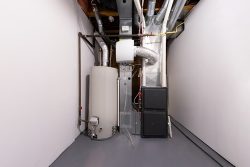Exploring Heat Pumps: Efficient HVAC Systems for Comfort and Savings
May 30, 2023 3:17 pm Leave your thoughts Exploring Heat Pumps: Efficient HVAC Systems for Comfort and Savings
Exploring Heat Pumps: Efficient HVAC Systems for Comfort and Savings
As homeowners, we want to ensure that our homes are comfortable and energy-efficient. Heating, ventilation, and air conditioning (HVAC) systems are essential components of any home, as they control the temperature and air quality. In recent years, heat pumps have gained popularity as an energy-efficient alternative to traditional HVAC systems. In this blog post, we will explore heat pumps and their benefits.
What Is a Heat Pump?
A heat pump is a heating and cooling system that transfers heat between the indoors and outdoors. Unlike traditional HVAC systems that generate heat, heat pumps extract heat from the air, water, or ground and distribute it indoors during the winter. During the summer, heat pumps reverse the process and extract heat from indoors to the outdoors.
Types of Heat Pumps
There are three types of heat pumps:
1. Air-source heat pumps: The most common type of heat pump that extracts heat from the outdoor air and distributes it indoors.
2. Ground-source heat pumps: Also known as geothermal heat pumps, they extract heat from the ground and distribute it indoors. Ground-source heat pumps are more expensive than air-source heat pumps but are more efficient.
3. Water-source heat pumps: These extract heat from bodies of water such as lakes and rivers.
Benefits of Heat Pumps
1. Energy-Efficient: Heat pumps are more energy-efficient than traditional HVAC systems. According to the Department of Energy, heat pumps can reduce electricity usage by up to 50% compared to traditional HVAC systems.
2. Cost-Effective: Although heat pumps may require a higher initial investment than traditional HVAC systems, they are cost-effective in the long run. Energy-efficient heat pumps can reduce energy bills and save homeowners money.
3. Consistent Temperature: Heat pumps distribute heat evenly throughout the home, ensuring a consistent temperature. Traditional HVAC systems may cause temperature fluctuations, resulting in uneven heating or cooling.
4. Easy to Install: Heat pumps are easy to install and require less space than traditional HVAC systems. The installation process is non-disruptive and can take as little as one day.
5. Environmentally-Friendly: Heat pumps are environmentally-friendly as they rely on renewable energy sources. They do not produce carbon emissions, reducing the carbon footprint of households.
6. Versatile: Heat pumps are versatile and can be used for both heating and cooling. They can provide year-round comfort to households.
7. Low Maintenance: Heat pumps require minimal maintenance compared to traditional HVAC systems. Regular maintenance such as changing air filters and cleaning coils can ensure optimal performance.
Drawbacks of Heat Pumps
1. Cold Weather Efficiency: Air-source heat pumps may not be as efficient in extremely cold temperatures. Homeowners may need to supplement the heat pump with a secondary heat source during winter.
2. Initial Cost: Heat pumps may require a higher initial investment than traditional HVAC systems. However, the long-term cost savings can offset the initial cost.
3. Installation: Although heat pumps are easy to install, they require professional installation. Homeowners should work with licensed professionals to ensure proper installation and optimal performance.
Conclusion
Heat pumps are an energy-efficient alternative to traditional HVAC systems. They provide year-round comfort, consistent temperature, and are cost-effective in the long run. However, homeowners should consider the initial cost and temperature limitations before installing a heat pump. Overall, heat pumps are an excellent choice for homeowners who want to save money on energy bills and reduce their carbon footprint while maintaining a comfortable home.
Categorised in: Heat Pumps, HVAC
This post was written by admin

 Exploring Heat Pumps: Efficient HVAC Systems for Comfort and Savings
Exploring Heat Pumps: Efficient HVAC Systems for Comfort and Savings